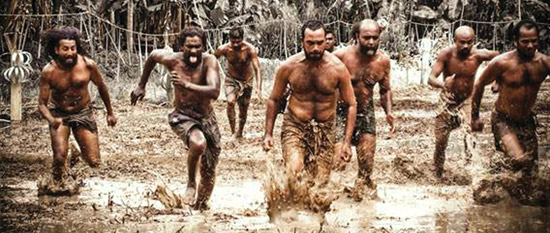Bambara Walalla: Insightful study of people in crisis
Film review
Dr. Senarath Tennakoon
Bambara Walalla (The whorl wind) is a remarkable film directed by
Atula Liyanage. The modus operandi of the film is like that of poetry is
to hint, to awaken echoes and suggest connections rather than to fix or
nail down specifics.
|

A scene from Bambara Walalla |
The intelligent cinema lover has to make his or her own connections
about the characters, the events and the settings. In the wilderness of
events the intelligent cinema goer has to carve the inner landscape of
the film which is familiar yet unexposed and enigmatic.
The themes highlighted in the film are related to sexual exploitation
of women, incest, business rivalry and strategic criminal manipulations.
All these themes operate in a hostile deprived environment where their
is human exploitation in a socio-economically deprived cultural
environment and the setting is largely rural.
The plot revolves around Podi Eka (the small one) Podi Eka’s mother
is living with her second husband who has been sexually exploiting the
mother as well as Podi Eka’sgrown up sister. Podi Eka has killed this
step father (Bappa) and goes to prison while her sister kills herself by
hanging. The mother becomes insane.
After serving his term of imprisonment he becomes a slave worker of
his so called uncles. Podi Eka is now a grown up man with a strong
physique but with an uneducated mind and rough features. He tries to
moles the uncle’s grown up daughter. He cuts off the daughter’s hair. He
was assaulted and has to be hospitalized.
From there he is taken over by a funeral undertaker Mel, who looks
after him and makes use of him for his nefarious activities. Mel has a
business rivelary.
He carries on with his disabled son’s pretty young wife. Podi Eka has
to kill Mel’s enemies and engage in a business financial robbery too. In
the rush he gets involved with a woman who has been previously married
to Mel’s disabled son. In fact he was made a cripple by Mel’s thugs. The
film ends with the tragic death of Mel and Podi eka becoming a member of
the new undertaker ownership of Mel’s son and his wife. Podi Eka’s
mother becomes insane and the film does not show what happened to her
other than leaving the home for good.
The cast include Nita Fernando who as Podi Ekas mother plays the role
of a mad woman, Anuraddika Padukkge as her grown up daughter who hangs
herself to death. Damitha Abeyratne too plays a significant role as an
exploited unhappy young woman. These are the only three female
characters and these are not the major roles. Mahendra Perera as the
undertaker Mel plays a central role. He is a man with a double face,
shrewed and strategic with keen observant eyes.
He is a man with few words but the entire film operates on his wishes
and orders. Sryantha Mendis is the happy go lucky man who advices Mel
and pours oil to carry on the orders of Mel.
He is like a middle man and even keeps his position in the new
organization under Mel’s son. Bimal Jayakodi plays the role of the rival
business undertaker of Mel. Jayalath manoratne too exploits the skills
of Podi Eka giving him food and shelter after Podi eka’s return from
imprisonment. His performance is quite praiseworthy and enigmatic. Atula
Liyanage as Podi eka attempts to give life to a strong young man with
rough features.
He is a left-hander since childhood. But has to become a right-handed
person because of Mel. He is illiterate. He uses metaphorical language
when he expresses his sexual desire to Jayalath Manorathne’s daughter.
This appears to be largely unrealistic. Further, his cries and laments
during critical situation too are rather unusual and artificial. The
ending of the film is quick and pivotal in nature. The disabled son
shooting the father (Mr Mel) and standing up with the help of the
clutches to take up the old business are all acts preformed in haste for
making a happy ending.
After seeing this film the intelligent cinemagoer would ponder
whether Podi Eka’s life ways have been predetermined by his genes or
shaped by the hostile social environment further the film does not seem
to end. Again the new business of dealing with the disposal of the dead
begins under the new organization with the old faces in new roles.
“What we call the beginning is often the end. And to make an end is
to make a beginning. The end is where we start From” (T.S.Eliot’s Four
Quartets). |



